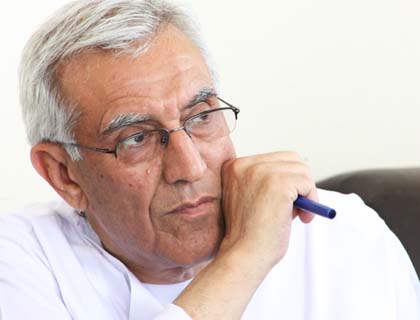Another grand loss for the President Karzia's government! On Wednesday July 27, a suicide attack took life of the Kandahar city mayor, Mr. Ghulam Haidar Hamidi, in the municipality complex. He is the second high-ranking official targeted by suicide attacker of Taliban militants, after assassination of Ahmad Wali Karzia, half brother of President in the province. He was killed when he was about to meet with tribal leaders because of angers and irritation about municipality's project. Municipality had recently begun destroying private residence built on state land.
But his murder reportedly has nothing to do with the project and the suicide bomber planted explosive in his turban approached him and denoted the explosives. As usual, Taliban militants claimed the responsibility.
However, the Taliban and its al-Qaeda always tried to kill top officials and influential people within the government, but seemingly the recent series of targeted assassinations are showing a new turn to their policy. In May, General Daud Daud, police chief of northern of the country. Within just three weeks, three top Afghan officials, who were popular and had strong mass support, MR. Ahmad Wali Karzia, half brother of President Karzia, and his top advisor, previously the governor of Urozgan province, and finally, the Kandahar mayor, Mr. Ghulam Haidar Hamidi, were assassinated last month.
These series of target assassination clearly shows a new turn to previous policy of Taliban-led militants. Generally speaking, the main objective of militants was to weaken government through dealing maximum toll to security forces, government employees and civilians. They instantly have avoided direct fire exchange with both foreign and Afghan security forces, because they have not had the power and strength to stand against well-equipped foreign forces.
However, it should be noticed, Taliban militants frequently have succeeded to push back Afghan police and armies from areas where they had under the control before, but certainly those incidents took part only when foreign forces or major part of Afghan armies already pulled out of the area to hold operations somewhere else. In another word, no body oppose the notion that during past ten years of engagement, militants have always avoided direct fire exchange with foreign forces, because such a war strategy would have diminished their strength and increased their casualties. They, all the time, saved their life resorting to guerrilla strategy—ambushes, escape, planting roadside bombings and training more suicide bombers.
The tactics that have proved deadly for Afghan people and foreign forces have been suicide bombers, roadside bombings, and some well-planned ambushes. In this juncture, suicide bombers were mostly used to detonate themselves in meetings, gathering, public places and government offices. The motive was to deal maximum toll and casualties in order to scare civilians and pressurize government.
Seemingly, now the focus of Taliban has changed and they are zooming people who have large public support. The slain high-profile officials were not only important for government as holding posts and discharging their activities well; they were important because they were key part of Karzia's administration as well as a channel between civilians and government. They had deep influence on particular tribes and community and could strengthen the foundation of the government through mass civilians support.
At the present, the question is, "Why Taliban leaders have changed the policy and holding targeted assassinations?" though the country is in the amidst of the military withdrawal which will be completed in 2014.
Previously, I have written about the intention of militants from intensification of attacks and violence during current military withdrawal process. Here I want to write about changes in strategy of militants.
There are two assumptions: one, killing of high ranking officials is led by supporters of Taliban militants and its al-Qaeda ally, and, second, Taliban are preparing themselves for a better scenario possibly in chaotic political situation after the completion of military withdrawal process.
However, no body in Afghanistan has doubt Taliban have beyond border supporters and they ask Kabul government and its foreign allies to eliminate the roots of Taliban and terrorist networks beyond the borders. And, however, the first assumption has value to be noticed, but here I write about the second assumption.
Definitely, the process of military withdrawal somehow depends on the notion of "Afghanization" of the counter insurgency struggle. In another word, in 2010, when President Obama surged US troops promised to change the momentum and then bring them back home. The aim was to force militants and make them lay down their arms and join the new democratic process. However, US troops got visible success in forcing militants out of their hideouts in Helmand and Kandahar, but militants do not agree with the notion.
By increasing attacks and intensification of violence, they try to say that Afghan government and its foreign allies are unable to defeat them. Instead, they have the power to organize and hold attacks across the country at will.. Even in peaceful areas, like Northern provinces. They go further and assume the military withdrawal as their success.
Ostensibly, the notion is prevalent among top Taliban leaders as well as among their common fighters. During and after the completion of military withdrawal, two scenarios can be drawn in the political sphere with Taliban, whether Karzia-led peace initiative will work out and militant join the government or they continue fighting government even after 2014. If establishment collapse and part of them join government, that wouldn't be possible without visible compromise by government, which also can be a good scenario.
But if talks with militants do not succeed and their resistance stretch beyond 2014, that would be the worst scenario, and seemingly Taliban leaders now herald to simple fighters. In this scenario, bureaucrats and officials who have come from abroad will not play important role. Those who become great trouble for militants are those who have public base and can stand against them out of government or administrative framework. Therefore, the recent targeted assassinations are a kind of preparation of militants for beyond 2014.

